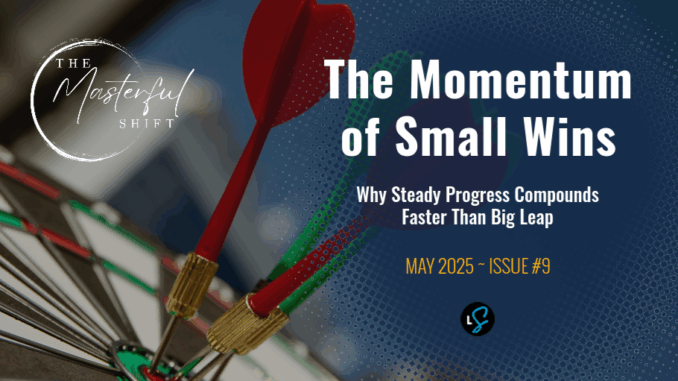
Momentum in business doesn’t always begin with sweeping change or bold declarations. More often, it starts with something far more subtle: a small win. These seemingly modest achievements—completing a task, resolving a minor issue, receiving positive feedback—carry a kind of magic. They build confidence, reinforce progress, and create the psychological lift needed to keep moving forward. In environments where complexity and pressure are constant, small wins offer clarity and motivation. They remind us that progress is possible, even when the path ahead feels uncertain or overwhelming.
The power of small wins lies in their immediacy. Unlike long-term goals that may take months or years to realize, small wins deliver instant feedback. They provide tangible evidence that effort leads to results, however incremental. A team that successfully launches a pilot program, even on a limited scale, gains proof of concept. That success, however modest, validates the strategy and energizes the group. It’s not just about the outcome—it’s about the shift in mindset. Small wins signal that the work matters and that the team is capable of achieving more.
Psychologically, small wins tap into our need for progress. Human beings are wired to seek completion and closure. When we check something off a list or solve a problem, our brains release dopamine—a neurotransmitter associated with pleasure and motivation. This chemical response reinforces behavior and encourages repetition. In a business context, this means that celebrating small wins can lead to sustained effort and greater engagement. A manager who acknowledges a team’s incremental progress fosters a culture of momentum. That culture becomes self-reinforcing, as each win fuels the next.
Small wins also help break down resistance. Large goals can feel intimidating, especially when they require significant change or coordination. By contrast, small wins are approachable. They allow teams to take action without being paralyzed by scale. A company looking to improve customer experience might start by redesigning a single touchpoint rather than overhauling the entire journey. That initial success builds confidence and provides insight, making the next step easier. Over time, these small wins accumulate, creating a ripple effect that leads to meaningful transformation.
In leadership, recognizing and leveraging small wins is a strategic skill. Leaders who understand the psychology of progress know that momentum is built, not demanded. They look for opportunities to highlight achievements, however minor, and use them to reinforce vision and values. This doesn’t mean lowering standards—it means celebrating effort and learning. A leader who praises a team for identifying a bottleneck and proposing a solution is reinforcing problem-solving and initiative. That recognition encourages others to contribute and take ownership. It turns leadership into a catalyst for growth rather than a source of pressure.
Small wins also play a role in navigating change. Transitions—whether organizational, technological, or cultural—can be destabilizing. People naturally resist uncertainty and fear loss. Small wins offer reassurance. They show that progress is happening, that the change is manageable, and that success is within reach. A company implementing a new software system might start by training a small group and sharing their positive experience. That story becomes a model, reducing anxiety and building buy-in. Change becomes less about disruption and more about evolution.
Momentum built through small wins is not just psychological—it’s operational. When teams experience success, they become more efficient, more collaborative, and more focused. They learn what works, refine their processes, and build trust. This operational momentum translates into better execution and faster iteration. A marketing team that sees strong engagement from a new campaign will be more confident in testing variations. A product team that receives positive user feedback will be more motivated to enhance features. These cycles of action and response create a rhythm that drives performance.
Importantly, small wins must be visible. If progress goes unnoticed, its motivational power is lost. Businesses must create systems and cultures that surface and celebrate achievement. This could be through regular check-ins, dashboards, or storytelling. The goal is not to inflate minor accomplishments, but to recognize their role in the larger narrative. When people see how their work contributes to progress, they feel connected and empowered. That connection is what sustains momentum over time.
The magic of small wins lies in their ability to transform inertia into energy. They offer a way to navigate complexity, build confidence, and create movement. In a business world that often prizes scale and speed, small wins remind us that progress is built step by step. They show that success is not a single event, but a series of choices, actions, and reflections. And when those choices are made with intention and celebrated with care, they create a foundation for lasting impact. Momentum, after all, is not found—it’s built. And small wins are the bricks that make it possible.